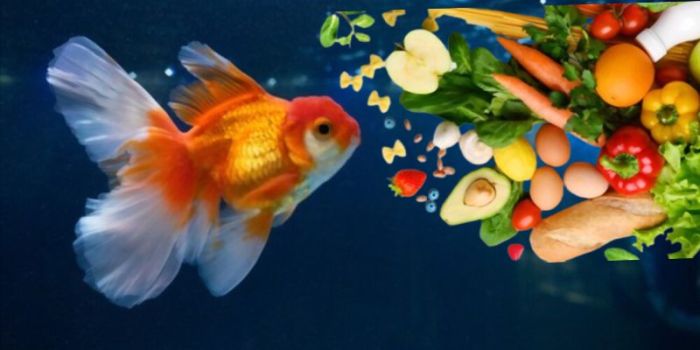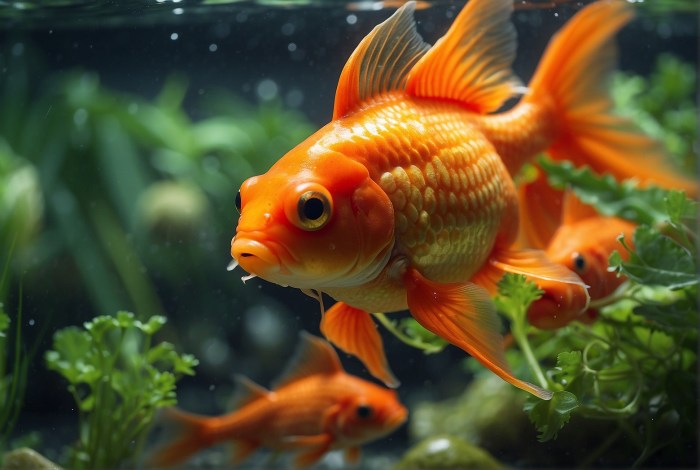Can goldfish eat vegetables? It’s a question that often arises among fish owners, particularly those seeking to provide a diverse and nutritious diet for their aquatic companions. While goldfish primarily rely on commercially produced pellets and flakes, incorporating select vegetables can add variety and potentially enhance their overall well-being.
Goldfish, in their natural habitat, are omnivores, consuming a range of plant and animal matter. This diverse diet ensures they receive essential nutrients for growth, energy, and immune system function. However, in captivity, their diet often becomes restricted, emphasizing the importance of careful consideration when introducing new food sources like vegetables.
Goldfish Diet Basics: Can Goldfish Eat Vegetables

Goldfish, popular aquarium inhabitants, require a balanced diet for optimal health and longevity. Understanding their natural feeding habits and nutritional needs is crucial for providing them with the right food.
While goldfish can enjoy a variety of vegetables as part of their diet, it’s important to choose options that are safe and digestible. A common question among goldfish owners is can goldfish eat algae wafers , which are often marketed as a healthy addition to their diet.
Algae wafers are primarily designed for herbivorous fish, and while goldfish may nibble on them, they should not be a primary food source. Instead, focus on providing a balanced diet that includes high-quality flakes, pellets, and occasional treats like blanched vegetables.
Natural Diet of Goldfish
In their wild habitat, goldfish are omnivorous, feeding on a variety of food sources. Their diet primarily consists of:
- Aquatic insects:These provide a source of protein and essential fatty acids.
- Algae:A source of vitamins and minerals, particularly carotenoids.
- Zooplankton:Microscopic organisms that provide protein and other nutrients.
- Plant matter:Including decaying leaves and water plants, offering fiber and vitamins.
Essential Nutrients for Goldfish, Can goldfish eat vegetables
A balanced goldfish diet should provide a variety of essential nutrients, including:
- Protein:Crucial for growth, tissue repair, and overall health.
- Fat:Provides energy and essential fatty acids for healthy skin and scales.
- Carbohydrates:Energy source for active goldfish.
- Vitamins:Essential for various bodily functions, including growth, immune system, and vision.
- Minerals:Play vital roles in bone health, muscle function, and metabolism.
Common Goldfish Food Options
A variety of commercial food options are available for goldfish, each formulated to meet specific nutritional needs:
- Pellets:These are a popular choice due to their convenience and nutritional balance. Pellets come in various sizes and formulas, catering to different goldfish ages and sizes.
- Flakes:Flakes are another convenient option, often preferred by smaller goldfish. They are available in various formulas, including those enriched with vitamins and minerals.
- Live Foods:While not always readily available, live foods, such as brine shrimp, bloodworms, and daphnia, can provide a natural and nutritious supplement to a goldfish’s diet.
- Frozen Foods:Frozen foods, such as bloodworms, brine shrimp, and mysis shrimp, offer a convenient alternative to live foods and provide a good source of protein and essential nutrients.
Benefits of Vegetable Consumption

Incorporating vegetables into a goldfish’s diet can offer a variety of health benefits, enhancing their overall well-being and contributing to a more balanced and nutritious eating plan. While commercially available goldfish food provides essential nutrients, vegetables offer a unique nutritional profile that complements and enriches a goldfish’s diet.
Nutritional Content of Vegetables vs. Goldfish Food
Vegetables provide a diverse range of nutrients that can supplement a goldfish’s diet. They are rich in vitamins, minerals, and fiber, which can be lacking in commercially produced goldfish food. For example, vegetables like spinach and kale are excellent sources of vitamins A, C, and K, while carrots are rich in vitamin A and beta-carotene.
These nutrients are essential for healthy growth, vision, and immune function.
- Vitamins:Vegetables are packed with essential vitamins like A, C, K, and B vitamins, which are vital for maintaining a healthy immune system, promoting growth, and supporting various bodily functions.
- Minerals:Vegetables are also a good source of minerals such as calcium, iron, potassium, and magnesium, which play crucial roles in bone health, blood production, and muscle function.
- Fiber:Dietary fiber is essential for digestive health and helps regulate bowel movements. Vegetables are rich in fiber, which can contribute to a healthy digestive system and prevent constipation in goldfish.
Contributions to a Balanced Diet
Vegetables can contribute to a balanced and varied diet for goldfish. They provide a different texture and flavor than commercially available goldfish food, encouraging goldfish to explore different food options. This variety can stimulate their appetite and contribute to a more diverse and enriching diet.
“A varied diet can help prevent boredom and encourage a goldfish to eat more, promoting a healthy weight and preventing nutritional deficiencies.”
- Dietary Variety:Vegetables offer a change in texture and flavor, stimulating a goldfish’s appetite and contributing to a more diverse and enriching diet.
- Improved Digestion:The fiber content in vegetables aids in healthy digestion and can prevent constipation, promoting a healthy gut environment.
- Reduced Risk of Nutritional Deficiencies:The diverse range of vitamins and minerals in vegetables can supplement a goldfish’s diet, reducing the risk of nutritional deficiencies often associated with relying solely on commercially available goldfish food.
Wrap-Up
Ultimately, whether or not to feed vegetables to your goldfish depends on individual preferences, dietary needs, and the specific type of vegetables being offered. By understanding the potential benefits and risks, as well as the proper preparation methods, you can make informed decisions about your goldfish’s diet and ensure their long-term health and happiness.
While goldfish are primarily herbivores, their diet shouldn’t solely consist of vegetables. While they can enjoy some leafy greens, it’s crucial to understand what’s safe. A common question is can goldfish eat celery , and the answer is a resounding no.
Celery is too fibrous and difficult for their small digestive systems to process, potentially leading to health issues. A balanced diet of commercial goldfish flakes, occasional treats like blanched peas, and small amounts of appropriate vegetables is key to keeping your goldfish healthy and happy.
While goldfish can enjoy a variety of vegetables as part of a balanced diet, it’s crucial to remember that their digestive systems are not designed for processed foods. This means that feeding them bread, as some might suggest, can be harmful.
Can goldfish eat bread ? The answer is a resounding no. Stick to nutrient-rich vegetables like peas, spinach, and zucchini for a healthy and happy goldfish.